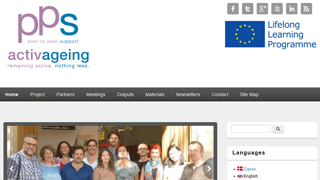
| Short descriptor of good practice |
| The “Peer to Peer Support Fostering Active Ageing Project” is a European initiative launched in 2014, aimed at enhancing the quality of life for older adults aged 55 and above. This collaborative project, involving organizations from six European countries, focuses on developing and implementing training programs for active ageing. Central to the project is the peer-to-peer training approach, where older adults are trained to educate their peers in aspects of active ageing, encompassing health, social participation, lifelong learning, employment, and recreation. Key elements of the project include conducting surveys and research to understand the needs and aspirations of the elderly in partner countries, utilizing retired experts as facilitators, and offering educational programs both in traditional classrooms and through e-learning platforms. This approach ensures accessibility and relevance to a diverse older population. Funded by the European Agency for Education, Culture, and Audiovisual Media, the project underscores the importance of voluntary participation and is free of charge for participants. Its goal is to empower seniors to lead more active, fulfilling lives and to address the challenges and opportunities presented by an ageing population in Europe. |
| Type of setting where good practice is delivered |
| Adult education organizations Non-formal learning, Lifelong Learning – 30 hours face to face training program – 30-hour e-learning training program |
| Time Frame for delivery of good practice |
| A 30-hour Face to face training program on active ageing addressed to older adults is structured in terms of desired learning outcomes and aims at rising perceived self-efficacy and copying skills of participants. Partnership also developed a 30-hour E-Training Program on active ageing that has the same structure and content as the Face to face training program. |
| Type of learner the best practice is supporting |
| – Seniors 55+ – peer facilitators or mentors from the same age group |
| Resources used as part of good practice |
| https://www.proyectosupua.es/pps https://www.proyectosupua.es/pps/content/outputs |
| Aims and objectives of good practice |
| – to develop a comprehensive methodology for promoting active ageing – to create training programs that have equipped older adults with the knowledge and skills needed for active ageing, covering various aspects such as health, social participation, lifelong learning, senior employment, and recreation – to train and prepare older adults (peers) to conduct educational programs and provide support to their peers, creating a supportive network among older adults – to develop structured modules that cover a range of topics relevant to active ageing – to identify and train facilitators or mentors who will lead the group of older adult participants – to conduct pilot training programs for older adults in both face-to-face and e-learning formats to assess their effectiveness In summary, the project’s aims and objectives revolve around developing a comprehensive methodology and training programs that empower older adults to lead active and fulfilling lives in their later years, with a focus on peer-to-peer support and tailored education. It seeks to enhance the well-being, health, and social engagement of older adults across Europe. |
| Evidence as to why this was considered good practice |
| “Peer to Peer Support Fostering Active Ageing Project” is considered good practice because it aligns with evidence-based principles in adult education, active ageing, and program development. Its holistic, peer-centered, and customized approach, coupled with ongoing evaluation and responsiveness to real needs, positions it as an effective initiative for promoting active and healthy ageing among older adults in Europe. The use of peer-to-peer training is grounded in research showing that older adults often respond positively to learning and support from their peers. Peer mentors can relate to the experiences and challenges of their peers, fostering a sense of trust and camaraderie. This approach is supported by evidence from successful peer-led programs in various domains. The project’s commitment to tailoring content to national specifics and individual needs is evidence-based. Offering training programs in both face-to-face and e-learning formats reflects best practices in adult education. By addressing active ageing, the project contributes to the well-being and quality of life of older adults. Research consistently shows that promoting active ageing can lead to better health outcomes, improved social engagement, and enhanced overall well-being among older populations. |
| 3 Key learning Principles that were used in this good practice to support senior learners |
| 1. Andragogy and Self-Directed Learning 2. Experiential Learning 3. Customization and Tailored Learning |
| Any additional learning that we can take from this good practice example |
| / |
| Any Additional Information |
| https://www.youtube.com/user/PeerToPeerProject (project videos) |
